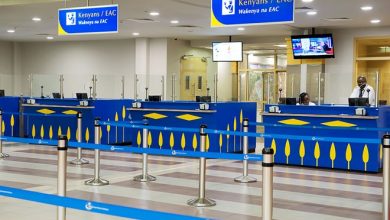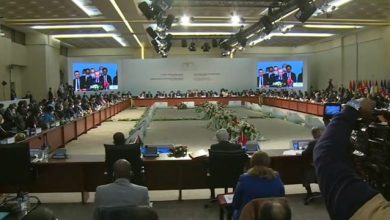New Albany man says trip to Saudi Arabia led to harrowing 3-day detainment
The trip was meant to open doors for Sharmarke Gaani, a New Albany businessman looking for new opportunities for his home-health company in Saudi Arabia, a country he had visited twice since 2017.
The trip was meant to open doors for Sharmarke Gaani, a New Albany businessman looking for new opportunities for his home-health company in Saudi Arabia, a country he had visited twice since 2017.
Instead, he said, he faced a terrifying three-day detention this year for no discernible reason in cramped, cold quarters.
“I have suffered mentally, physically and emotionally … I want justice, and I’m very thankful that I came back home safely,” he said.
It all happened after a half-day of flying from Columbus to Washington, D.C. to Jeddah, a coastal city in Saudi Arabia, on Jan. 25. Before Gaani could even make it to baggage claim, he said he was directed to a security window, where he showed his business visa, passport and other documents.
An attendant told him that his visa had been locked, gave him a note written in Arabic and directed him to another window where he was told to wait, he said.
“I’m investing in your country. What’s wrong?” he said he recalls asking.
Gaani, 53, who is Muslim and a native of Somalia, said he had made two previous trips to visit Mecca and Islamic holy sites without incident.
Eventually, a supervisor directed him to another office in the airport, he said, and told him that his visa had expired. A call to the U.S. consulate for help went unreturned, according to Gaani, who provided The Dispatch with a screenshot documenting the three-minute call.
After another 30 minutes passed, a supervisor asked if he was Somali. Gaani recalls responding: “I am an American citizen. I’m a Muslim, I don’t speak Arabic. My primary language is Somali.”
The man then pushed him against a wall and had two guards handcuff him, he said.
For the next three days, Gaani said he was locked in a detention room with eight other men. The room had no windows, a single open sink and toilet and several mattresses with no bedding. There were no facial coverings in the cramped, cold quarters, said Gaani, who was able to take a photograph with his phone.
Sharmarke Gaani says he was detained in this holding cell for three days in Jeddah, Saudi Arabia. Courtesy Of Sharmarke Gaani
Previous reports by Human Rights Watch and Amnesty International have reported similar events, describing “arbitrary and abusive” detentions in Saudi Arabia including “overcrowding, blocked and overflowing toilets, lack of beds and blankets and lack of medical care.”
The Middle Eastern nation is under increasing scrutiny for alleged human rights violations, including the gruesome murder and dismemberment in 2018 of Jamal Khashoggi, a Saudi dissident and Washington Post columnist who had criticized Saudi leadership. Details of the killing, believed to be approved by Saudi Crown Prince Mohammed bin Salman, were released Feb. 26 by the Biden administration in a report from the Office of the Director of National Intelligence.
Gaani said he was given just one, near-spoiled airline meal during his three days of confinement. He was not permitted to shower or brush his teeth. He said he was hit in the back and slapped by guards.
“They treated me and those others detained as little more than penned animals,” he said.
Much of the time, he sat crouched on the floor “to preserve body heat,” in the excessively cold room, he said.
At the end of the third day, Gaani said that he was told — without explanation or apology— that he could leave.
Among the first to hear Gaani’s story upon his return was Hassan Omar, president of the Somali Community Association of Ohio.
“He was extremely exhausted and terrified,” Omar said.
Gaani said he’s still looking for some sort of explanation or apology.
Spokesmen for the U.S. consulate in Jeddah and the U.S. embassy in Riyadh, Saudi Arabia, said they could not comment and ultimately directed inquiries to the U.S. Department of State in Washington, D.C. That office did not immediately respond to the call or emails. Neither did Saudia airlines.
An employee from the Saudi Arabian embassy in Washington, D.C., who was not authorized to speak to the media, said she was shocked and saddened by Gaani’s account.
“As you’re saying it, with no reason and no explanation, it hurts,” the woman said. “It does not happen, especially to American citizens. It is not the norm.”
Gaani said he feared for his life.
“I was scared. It came to my mind, Khashoggi,” he said. “It crossed my mind. I was so terrified for my life and my children’s future.”
Gaani has four children, 11 to 19, who live with their mother and go to school in New Albany. He owns and operates Home Health Services and two years ago was one of 18 applicants for a Columbus City Council seat.
Gaani said after returning to the United States on Jan 28 he reached out to Ohio’s two senators, Sherrod Brown and Rob Portman, with emails asking why the embassy didn’t help him and urging them to help those who may face similar ordeals.
A letter that Sharmarke Gaani received after reaching out to Sen. Sherrod Brown about being detained in Saudi Arabia Provided By Sharmarke Gaani
Brown’s office told him in a letter, a copy of which was provided to The Dispatch, that there was nothing they could do and suggested he seek legal advice. Portman’s office told The Dispatch they could find no record of receiving any correspondence and could not comment.
Gaani said he wants to help others who may be traveling to Saudi Arabia be prepared for anything. But as for him, he doesn’t expect to return.
“I will never in my life go back to Saudi Arabia,” he said.





